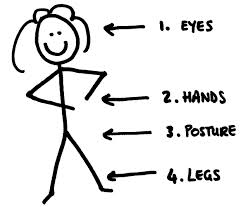Leaders Are Listeners: 10 Easy Steps to Effective Listening Skills
April 8, 2019 By Russ Peak Comments are Off communication skills, corporate leadership, effective listening, leadership development, leadership qualities, listening skills, student leadership
When you think of people you like to hang out with, chances are, one of their qualities is that they are good listeners. In the age of technology, listening is becoming a lost art. It’s easy to let the pseudo-communication of social media and texting replace real conversations.
But, leaders are listeners.
When you listen, you learn. And it shows people that what they have to say is important. Think about it. The people who listen to us are the ones we move toward. When we are listened to, it validates us and helps us open our minds.
To enhance the human connection on your campus, show some leadership and follow these strategies to better listening.
1. Listen, listen, listen.
Just like you’d get yourself in the mental mode to play your favorite sport, take a test, or drive a car, it’s important that we mentally prepare ourselves to listen. Listening takes discipline – similar to training for your sport, studying for a test or learning to drive! So practice with intention.
2. Get rid of distractions.
 Put away your smartphone. Period.
Put away your smartphone. Period.
It’s a drag when someone feels like anything and everything else is more important than the person standing in front of them.
If you’re in a crowded, noisy place (such as a party or game) and it’s an important conversation, ask to move somewhere that’s quieter.
3. Don’t judge too early.
It’s easy to jump to conclusions before we have heard the whole story. Listening is also about waiting and patience (remember how it’s a discipline?) Don’t feel bad if you’re not in complete agreement with the other person. Leaders acknowledge and respect others’ views.
4. Ask questions.
When you ask questions, you convey genuine interest. It makes people feel good. Meaningful questions help a conversation take on more depth, and you create a rapport and trust with the other person. And – leadership is about gaining the trust of others.
5. Focus on key ideas – and what isn’t said out loud.
Instead of drifting off in boredom, listen for and extract the central idea.
This means to pay close attention to what is being said beneath the words. Focus on what’s NOT being said, too. Interpreting another person’s tone and feelings takes some observation and insight.
6. Don’t forget about body language.
Great listening skills go beyond what your ears are doing. Face the other person, maintain eye contact, and nod your head to demonstrate you’re fully committed to the conversation.
7. Suspend your own agenda.
Often, instead of listening to what’s actually being said to us, we mentally formulate our response. It’s hard, but focus on the speaker’s words and forget about your stuff. Sometimes, people don’t want advice. They just want a listening ear.
8. Empathize.
Consider the speaker’s point of view as if their concepts were your own. Empathy places you in the other person’s shoes and helps you gain a sense of their feelings and experiences. It’s not easy, but you’re practicing!
9. Acknowledge their point of view is valid.
People are different. We often don’t agree with others, but great listening includes acknowledgement. Their point of view is just as important and worthy as our own. Remember, everyone wants to feel important!
10. Paraphrase.
Repeat back the speaker is saying to make sure you’ve understood. This also demonstrates attentive listening. For example,
“So you’re telling me that you think my employee evaluation process is unfair?”
“Oh… so you hate the music we play at our dances?”
That’s it! Practice these listening techniques throughout your week and let me know how it goes.
Or, if I’ve missed one, please let me know in the comments section below. Thanks!
Latest posts by Russ Peak (see all)
- A Simple Phrase That Leaders Need To Know - April 18, 2019
- Leaders Are Listeners: 10 Easy Steps to Effective Listening Skills - April 8, 2019
- How To Set Goals | Quality #4: Make Your Goals Personal - April 1, 2019
- How To Set Goals | Quality #3: Make Your Goals Reachable | - April 1, 2019
- How To Set Goals | Quality #2: Make Your Goals Specific - April 1, 2019
Find out more about booking Russ Peak today!
Like Russ On Facebook



